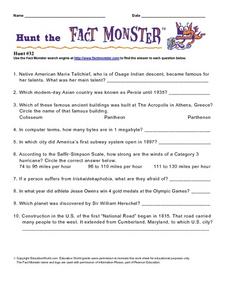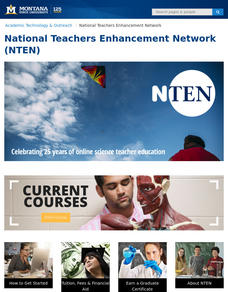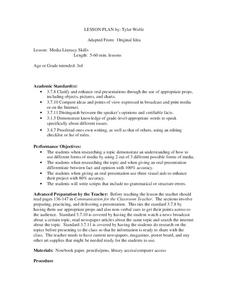Curated OER
Hunt the Fact Monster: February #3
In this search engine worksheet, 3rd graders will need to use factmonster.com to discover answers. Students will respond to 5 multiple choice questions using the given website.
Curated OER
Hunt the Fact Monster: February #1
In this search engine worksheet, 3rd graders will need to use factmonster.com to discover answers. Students will respond to 10 short answer questions using the given website.
Curated OER
Hunt the Fact Monster #32
In this search engine worksheet, 3rd graders will need to use factmonster.com to discover answers. Students will respond to 10 short answer questions using the given website.
Curated OER
Hunt the Fact Monster #30
In this search engine learning exercise, 3rd graders will need to use factmonster.com to discover answers. Students will respond to 10 short answer questions using the given website.
Curated OER
Hunt the Fact Monster #27
In this search engine worksheet, 3rd graders will need to use factmonster.com to discover answers. Students will respond to 10 short answer questions using the given website.
Curated OER
Hunt the Fact Monster September #1
In this internet research worksheet, 3rd graders answer five unrelated questions by using the Fact Monster search engine for their research.
Curated OER
Hunt the Fact Monster September #4
In this internet research worksheet, 3rd graders answer five unrelated multiple choice questions by using the Fact Monster search engine. A sample question asks; "Which of the traits below is not a trait of a good citizen?"
Curated OER
Hunt the Fact Monster October #1
In this internet research worksheet, students search for the answers to five multiple choice questions. They are directed to use the Fact Monster search engine.
Curated OER
Hunt the Fact Monster September #2
In this internet research worksheet, 3rd graders use the Fact Monster search engine to find the answers to five multiple choice questions. A sample question asks: "Which ocean borders the African country of Ghana?"
Curated OER
Aquatic Safari
Learners use an Internet Web site to locate the scientific information about various marine species. They use the Internet to find the scientific information about marine animals.
Curated OER
Hunt the Fact Monster
In this Fact Monster search engine worksheet, students access the Internet to a specific website to find the answers to five questions with multiple choice answers.
Curated OER
Hunt the Fact Monster
For this Fact Monster search engine worksheet, learners access the Internet to a specific search engine to find the answers to five questions with multiple choice answers.
Curated OER
Choose a Fish
In this Internet research worksheet, students go to the indicated Internet site and choose a particular fish to report on. Students find facts about the fish and its size, habitat, diet and description. Students draw and color a picture...
Curated OER
Research Skills: Information Retrieval and Evaluation
Focus on research skills, specifically identifying key words and concepts on a specific topic and evaluating information for relevance and authority. This is part of a multi-step lesson on Ancient Rome; however, it is useful for any...
Curated OER
Where Did Foods Originate? (Foods of the New World and Old World)
What do papayas, peanuts, pineapples, and potatoes have in common? Why, they are foods explorers brought back to the Old World. Young researchers use the Internet to investigate how New World explorers helped change the Old World's diet....
Curated OER
Discovering Differences Between Internet Search Engines
Students explore the differences in search engines available on the Internet. Most users are unaware of the differences between search engines. Some sample larger or smaller portions of the World Wide Web than others.
Curated OER
How Do You Know?
What is the difference between primary and secondary sources? Help your middle schoolers develop a knowledge of appropriate sources to use when doing accurate research. They develop unique ways to incorporate literature in historical...
Curated OER
Unanswered Questions in Number the Stars
Students read a book, "Number by the Stars." Students explore the internet and search engines. Through guided internet research, students find answers to questions posed in the book. Students share their internet experiences and discuss...
Curated OER
Do Some Research: Bones in the Body
Where are the smallest bones in your body located? Using the Internet and/or library, young biologists locate, illustrate, and write an explanation of where these tiny bones can be found.
Curated OER
Using the Internet to Challenge Young Writers
Designed as a professional development exercise to introduce teachers to the Internet, the activities in this resource ask novice web surfers to access a series of sites, bookmark them, and answer question about information found on the...
Curated OER
Marvelous Manatees
Two groups consider whether or not the Florida manatee will become extinct during their lifetimes. They research manatee populations and statistics together and then a class debate is held. Afterwards they consider how reliable their...
Curated OER
Media Literacy Skills
You're on camera! Third graders find a news story and research it to get more information. Everyone uses their found information to write a script and create their own news broadcast!
Curated OER
Don't Get Lost on the Web
Scholars discuss purpose of search engines, define World Wide Web, become familiar with website addresses, demonstrate understanding of site updating, create a list of topics about which they would like more information, and visit at...
Curated OER
The Water Cycle - Main Components
Present the water cycle to your middle schoolers with this lesson. After an anticipatory set, they participate in a Q & A session about the terms associated with the water cycle: evaporation, transpiration, condensation, and...

























